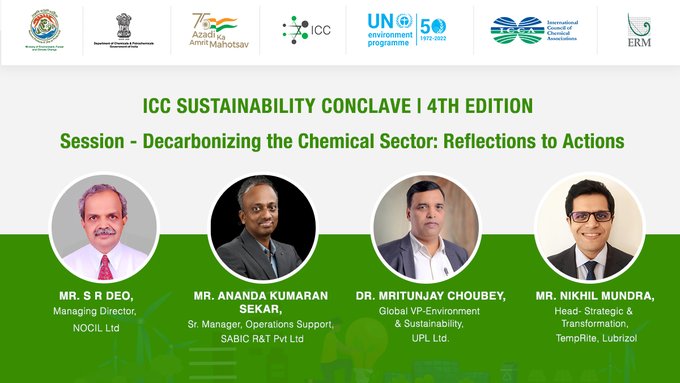Despite low per-capita emissions of 1.8 tons of carbon dioxide, India is the third-largest emitter globally, emitting a net 2.9 gigatons of CO2 equivalent every year. In keeping with this scenario, the country has set an ambitious target to become a net-zero emitter by 2070 at COP26.
It goes without saying that to accelerate decarbonization without compromising on its economic growth, India must pursue major opportunities such as green hydrogen; carbon capture, usage, and storage (CCUS); natural climate solutions; and material circularity.
As per experts, the awareness among chemical industry members and deregulation of unnecessary stringent laws could be the key drivers for accelerating the adoption of sustainable practices.
“Indian Chemical Council constituted the Carbon Neutrality Taskforce that held its first meeting on August 09, 2022 which was later followed by the second meeting on November 02, 2022. The aim is to build better awareness on sustainability in the chemical industry besides paving the way for supportive policies. If we want to achieve decarbonization, we need to change the energy mix and focus on renewable energy. We also need environmental reform to reduce carbon emission. For example, aligning deep sea discharge with USEPA standards. Our stand is 150 ppm when USEPA allows 4000 ppm. Stringent regulations in terms of EPA add to the wastage. The Ministry of Environment must look into the EPA norms and align it. ZLD should not be made mandatory as it is not environmentally friendly,” said Dr. Mritunjay Chaubey, Global Vice President - Environment & Sustainability, UPL Limited.
Chaubey spoke on carbon neutrality assessment & decarbonization roadmap for chemical industry along with India's leading chemical industry experts at the 4th edition of Indian Chemicals Council (ICC) Sustainability Conclave held in New Delhi. The event was themed, ‘Boardrooms to Community- ESG, Carbon Neutrality, Operational Safety, Greener Solutions.’
Providing a peek into the current status on carbon neutrality implementation, Chaubey added, “As per the Nifty Fifty companies survey, 44% Responsible Care (RC) companies have carbon neutrality reports sought by third party sources and 31% RC companies have disclosed the Scope 3 emission. 15% RC logo holder companies have renewable source based targets. At UPL we have 19% for Scope 1 emission, 5% for Scope 2 emission and 79% for Scope 3 emission."
Sharing his thoughts on the confluence of circularity and climate action towards industry decarbonization, Ananda Kumaran Sekar, Senior Manager, Operations Support, SABIC R&T said, “There has to be a transition from fossil fuels and to achieve the same we need sustainable efforts to reach carbon neutrality. There is a growing awareness on the subject and chemical industry members have started implementing new initiatives. Industry is focusing more and more on safer chemicals, sustainable products, carbon efficiency and circularity. There is no doubt that the Scope 3 is one of key priority areas and in that direction, advanced chemical recycling, and renewable feedstock are being pursued actively."
Talking about his company's holistic sustainability journey, Nikhil Mundra, Head-Strategic & Transformation, TempRite, Lubrizol said, “Aligning business goals with sustainability goals is the way forward. There is a need to strengthen product handprint, reduce carbon footprint, incorporate data systems and influence public policy. Currently we are at 85% Scope 3 emissions which is a positive reflection. The products such as polymers and resin must be renewable based and we must encourage suppliers to adopt sustainable practices. In this direction, EcoVadis sustainability assessment can help in determining the environmental and social performance of the chemical partners."
The session on ‘Decarbonizing the Chemical Sector: Reflections to Actions’ was moderated by S. R. Deo, Managing Director, NOCIL Limited.
Various speakers expressed their views on climate, sustainable development and the steps that could be taken in this direction. CEOs and representatives of the Indian and global chemical companies, people working in EHS department in companies; Central and state government officials; Pollution control boards; International multilateral organizations; Global chemical industry bodies, and experts from academia and civil society organizations participated in the event.
